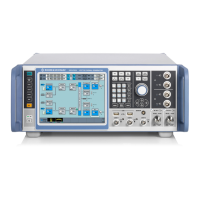Glossary: List of the Often Used Terms and Abbreviations
R&S
®
SMW200A
1351User Manual 1175.6632.02 ─ 30
Smart device: A mobile, cordless device, such as a smart phone or tablet, capable of
internet browsing.
Synonyms: Smart phone, tablet
SSD: Solid-state drive, see System drive
Standard baseband: Short designation of R&S SMW equipped with the options Base-
band Generator R&S SMW-B10 and Signal Routing and Main Module R&S SMW-
B13/B13T.
Standard mode: This term refers to the "System Configuration > Mode > Standard"
setting and is used as an abbreviation/synonym of it throughout this documentation.
This mode corresponds to the former Rohde & Schwarz signal generators capabilities,
like this of an R&S SMU or R&S AMU base instrument, without the MIMO Fading
option R&S SMU/AMU-K74. The representation of the block diagram is "classic", as it
is in the former instruments. The block diagram displays all blocks for that the required
hardware and software options are installed and shows the signal flow as it is.
Compare with Advanced mode
star configuration: A connection scheme for several instruments that consists of one
central instrument and several other instruments, all connected to the central one.
Stream: An I/Q stream describes the signal at the input of the "I/Q Stream Mapper" up
to the output connectors of the instrument.
Symbol Clock: Represents the frequency and exact timing of the transmission of the
individual symbols.
Symbol Rate: Calculated as follows:
"Symbol Rate" = "Bit Rate" / Number of bits transmitted with each symbol
Sync signal: In primary-secondary instrument mode, this term describes the signal
generated by the primary instrument and fed to the secondary instruments
The synchronization signal is a precise signal that facilitates the time alignment
between the instruments and acts as trigger signal.
System drive: The system drive holds the operating system, the firmware, and the
stored data. It can be a hard disk drive (HDD) or a solid-state drive (SSD).
Throughout this description, the system drive is referred as an internal memory,
because the SSD is optional hardware.
T
Trigger: Internally generated or externally supplied signal which starts signal genera-
tion at a particular point in time.
Trigger event: A trigger event is caused by the received trigger signal or executed
manual trigger.

